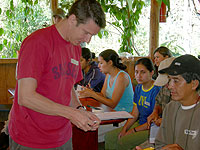- 18 October 2006
Biologist works with rainforest communities to save endangered monkey

Dr Peck teaching at the recent PRIMENET workshop in Ecuador
A year after launching a project to save one of the world's rarest monkeys, the University of Sussex biologist co-ordinating the scheme has made his first sighting of the elusive species.
It was not until the final day of the inaugural PRIMENET workshop for local communities in Ecuador that Dr Mika Peck observed the Brown-headed Spider Monkey (Ateles fusciceps) sunbathing in the trees. But when he realised volunteers had identified the critically endangered species thanks to the workshop, Dr Peck felt the rewards for every step of the 12 month-journey into the rainforest to launch the scheme.
The PRIMENET Project is based inside the Los Cedros Biological Reserve in the Ecuadorean Andes and was set up in November last year to protect the Brown-headed Spider Monkey and its rainforest environment. Dr Peck is co-ordinating the scheme, working with the environmental organisation Ecuador Terra Incognita to secure the future of the species and educate communities on long-term survival plans for the mammal. There are only 50-known breeding pairs of this Spider Monkey that still exist in the wild, with some experts predicting the species could disappear completely in 50 years.
Dr Peck, lecturer and research fellow in biology and environmental science, says: "It was the last day of the course and we had given balloons to the volunteers as a substitute for the actual monkeys to show them how to observe the animals. One of the groups came running over and said they had seen a Spider Monkey and when I followed them, I saw it , sunbathing in the canopy.
"It was the first time I had ever seen this species and it was a fantastic sight and a great way to finish the first training course."
More than 20 people aged between 16 and 50 years, from towns and communities surrounding the reserve attended the first-ever PRIMENET workshop. The five-day course is designed to train volunteers as para-biologists capable of monitoring the Spider Monkey, observing the mammal's natural environment and learning techniques to protect the species from extinction. Using methods he describes as 'citizen science', Dr Peck demonstrated how to conduct primate surveys and complete data sheets. Mammal experts from Ecuador also explained why the region is home to the Spider Monkey and outlined the country's environmental and conservation law.
Among the volunteers were two people who walked seven-hours from their homes to attend the PRIMENET workshop which ran for eleven hours each day. In a part of the world facing numerous conservation and environmental concerns, Dr Peck found people were enthusiastic to learn about methods to preserve the rainforest region where they live.
Dr Peck says: "We are trying to set up a network of local people who can help us to monitor the animal and in the future maybe carry out the work themselves. Where we are based is one of the poorest regions in the country but there are also strong links with eco-tourism. The trick is to create something that the people can continue themselves and by getting families from surrounding villages involved we can also add to their income."
The project has been secured with £230,000 funding across three years from the British Government-sponsored Darwin Initiative, which aids conservation in bio-diverse regions around the world. The scientific and education centre at Los Cendros allows people from diverse indigenous groups to learn how to collect data and monitor the monkey population, as well as supporting work to develop 'corridors' to link nature reserves across the region. Teams of scientists from the UK and Ecuador are also using the base to study flora and fauna.
Notes for editors
For further information on the PRIMENET Project, visit:
For details on the Los Cedros Biological Reserve, visit:
http://www.reservaloscedros.org/
For more information about the Darwin Initiative, visit:
Pictures of Dr Peck are available from the University of Sussex Press Office. Contact Jessica Mangold and Jacqui Bealing, tel: 01273 678209, fax: 01273 877456 or email: press@sussex.ac.uk